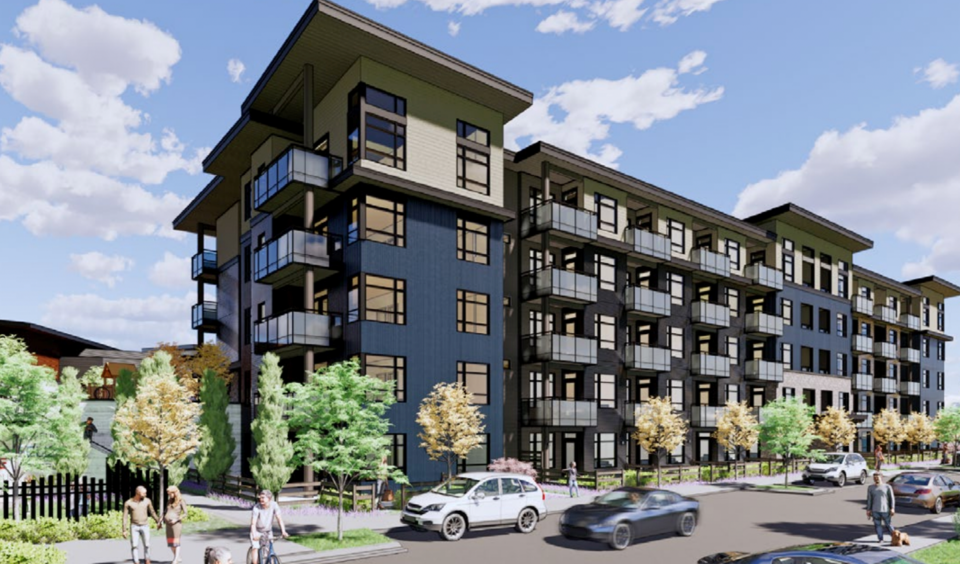The housing crisis was front and centre at Tuesday’s municipal council meeting, with clashing viewpoints on one project providing a window into the town’s affordability challenges.
On Dec. 20, debate centred on whether affordable housing units set aside for early childhood educators were actually affordable enough for a single person renting a single unit. Balanced against this point was the view that a quick approval was needed for the project, as a delay in an inflation-heavy economy could spell significant increases in construction expenses.
Council voted 4-3 in favour of giving two readings — rather than three as recommended by staff — to a housing agreement bylaw for non-market rentals in the Anthem Properties development on 1940 Centennial Way.
Council also added instructions to secure at least one of the one-bedroom units for a single-person household.
Councillors Eric Andersen, John French and Andrew Hamilton voted against the motion.
Affordable rentals was one of the conditions the previous council imposed on Anthem Properties when elected officials adopted a rezoning application for the development in July 2021. The project would replace the former Eagle Vista RV Resort and Campground with a sizable residential development that would come to fruition in multiple phases. It would bring dozens of condos, dozens of townhomes, several duplexes and, as discussed at this meeting, 80 rental units.
The debate on Tuesday evening centred on the 22 units of the 80 that are expected to be affordable rentals.
Of these 22 units, there would be 12 one-bedrooms, six two-bedrooms and four three-bedrooms.
At issue for some elected officials was that rental rates were not based on single-person households.
Staff said the maximum rental rates were calculated based on Statistics Canada measures. These rates would be calculated as 30% of the monthly income of the median of either single-parent families or “couple families,” which assumes a family with two people earning income.
A single-parent family would pay a rental rate of $1,098 for a one-bedroom.
For couple families, the rates were $1,484 for a one-bedroom; $1,979 for a two-bedroom; $2,474 for a three-bedroom.
However, there were no calculations for a single person living alone in a unit. Staff said this was because there are no studio units in the building.
Two units are supposed to be earmarked for early childhood educators, or ECEs.
Coun. Jenna Stoner said she was concerned that ECEs living alone might not be able to afford the rent.
“So if they are … a single-person household, it’s likely that they are — even at the lowest rate that we’ve presented here — going to be spending more than 30% of their income on rent,” Stoner said.
Municipal planning consultant Jessie Abraham said the rent rates for all the units are based on household income that’s published by Statistics Canada. As a result, ECE wages were not a consideration in the rent rate calculations.
Gary Buxton, general manager of community planning and infrastructure, said the data doesn’t zero in on one particular job.
“Unfortunately, it is sort of averaging rather than looking at the career-specific incomes,” said Buxton.
“I don’t even know if that data … by that employment type is that granular. Not sure if the census has that level of granularity.”
Stoner amended the motion to secure at least one unit at the income level of a person living alone.
“Our ECE workers who are single-person households, who don’t have kids, who don’t have a partner likely won’t be able to fit into the units that are here,” she said. “And so I think it’s a missed opportunity to not be securing one or two of these at the single-person household level.”
Councillors Chris Pettingill and Lauren Greenlaw supported this proposal.
Mayor Armand Hurford said there appeared to be an oversight that there weren’t any studio units. However, this shouldn’t keep a lone person from being accommodated.
“I think having at least one unit, which is the wording for the single-person households, as a condition of third reading, is a responsible way forward,” he said.
Instead of giving this bylaw three readings as originally recommended by staff, it was given two readings, with direction to secure at least one unit at a single-person income level.
However, other councillors had differing views.
Coun. John French said that time was of the essence, given the state of the economy.
“We’re in an inflationary period where any pause is costing big money,” said French. “We have other projects that are on the way. We can work with developers to make sure that they fill this gap that we’ve identified — a legitimate gap and definitely a concern. We can work with the housing society to make sure that this gets addressed. I’m just feeling like this is the time for us to move forward with this and allow this project to get its wheels rolling.”
Coun. Andrew Hamilton said it was important for the District to respect development timelines.
“While I do absolutely see the gap for the ECE workers and possibly the income gap that we’ve left there, I think that it is very important that when we’re working with developers, when we’ve set timelines, and we’ve set conditions for them to meet, that we actually meet those deadlines as well,” said Hamilton. “And so we need to move forward so that they can move forward in the things that we’ve asked them to move forward with.”
Staff said as a condition of the land development agreement, developers will not be issued a development permit until this housing agreement has been passed.
The bylaw will be adjusted following discussions between staff and the developer and will come back to council for third reading at a future date.







